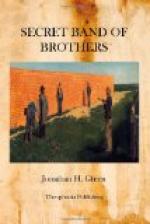Mr. Freeman said that he considered himself as an anti-gambler—but injustice had been done to gamblers, and he had defended them as far as he consistently could—and if an audience would meet him on Tuesday night, he would give them an anti-gambling lecture. He differed with Mr. Green.
Mr. Green wished to know why Mr. Freeman should dislike the law so much, if he considered gambling a bad vice—he (Mr. Green) really did not understand such a position. Such was the effect of gambling upon the mind, that he was sure that when Mr. Freeman first lost his money, (three thousand dollars,) and first became a gambler, he would not have spoken as he had that night. A young man, in gambling, was driven on by degrees, by the excitement of cards, of fine wines, society, &c. Gamblers ridiculed all ideas of reform, and said to the young man, you know all about us—we are called gamblers—and the young man thinks he knows all about them, as he finds them fascinating—but he knows nothing about them. When the young man is ruined, what do the gamblers do for him? Nothing. Such a young man in Baltimore was thus ruined, and became a sot—and at length had no place to sleep, unless the gamblers allowed him. One night, he was awakened by the gambler shaking him, and calling him a loafer. The poor man said, “I do not deserve this at your hands. This was the first house I gambled in.” The gambler threw him down stairs, and his head struck the curb-stone, and Mr. Green lent him his handkerchief to bind up the wound, and prevented further mischief being done to him. The next day he was found under one of the wharves—dead! And such was the treatment inflicted on him by the gamblers. Mr. Green then defended the new law.
Mr. Freeman said that he opposed the law because he thought it discreditable to Pennsylvania—that there should be a law to the effect that, “If I play cards, a man may say to me—there, you have done an act that, if legally visited, would send you to the Penitentiary.” Mr. Freeman illustrated his views by a reference to the explosion of steamboats. Mr. Freeman said that there was never but one gambler put into prison south of Mason & Dixon’s line. Mr. Freeman hinted that Mr. Green at Harrisburg had shown gambling tricks upon cards, with packs that were known to him—prepared cards, in fact. He thus astonished the natives. And this was one influence brought in aid of a passage of the law.
A vote was then taken on the question—“Shall the proceeds of this night be given to Mr. Freeman?” It was decided in the affirmative by a large majority.




